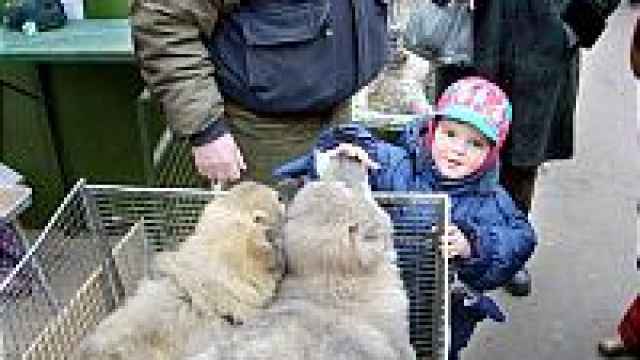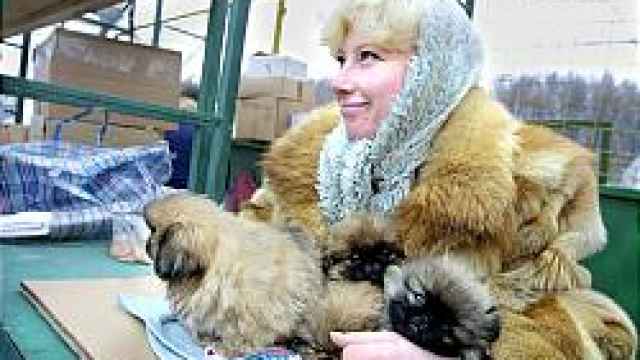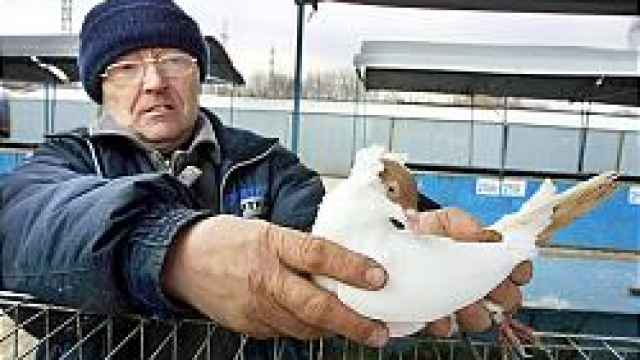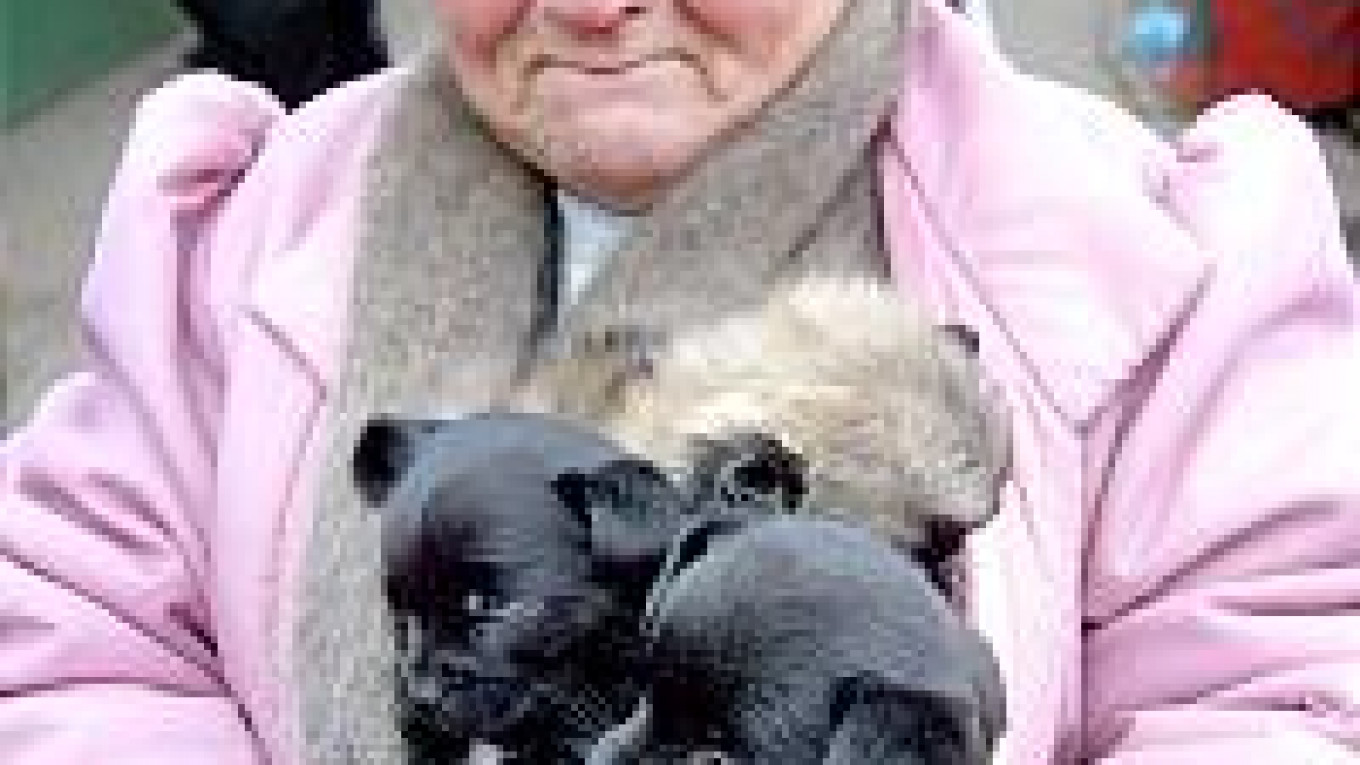The father had bargained the seller down to 2,000 rubles ($63) from his asking price of 3,000 rubles when the seller turned and saw a reporter with a notebook. He excused himself and walked away from the parrot and his booth.
He did not come back any time soon.
After decades of providing Moscow children with pets, the Ptichy Rynok was shut down in December 2001 due to unsanitary conditions, sales of endangered animals and other problems.
The pet market reopened last spring in a new location with tighter controls, but some of the old problems remain.
"I'm not sure that today after moving the market that all is well," said Sergei Kovalchuk, adviser to chief city architect and planner Alexander Kuzmin.
Each weekend, 4,000 to 5,000 traders bring every kind of animal "not prohibited by law" to the market for sale, said Vladimir Sinitsyn, deputy director of the new Ptichy Rynok administration.
On a recent visit to the new Ptichy Rynok, there were dogs, cats, rodents, barnyard animals and even raccoons, chinchillas and peacocks for sale -- all pointed out by a minder who the pet market administration insisted accompany a reporter and photographer.
Traders covered boxes full of puppies with blankets to protect them from the cold. Chickens squawked from cages so full of birds that they could barely move. Babushkas walked around the market with kittens peeping out of their coats, avoiding the 80-ruble-per-day fee to use a booth. Any animal accessory imaginable was also available.
Since the 1930s, Muscovites had visited the Ptichy Rynok at its previous location on Bolshaya Kalitnikovskaya Ulitsa near Taganskaya Ploshchad to buy pets for their children, sell their own pets' offspring or just look around as if it were a zoo.
"The old market was very famous, and for many people it was a case of nostalgia," Kovalchuk said. "It was not just a market but also a meeting place. It was meant for children."
After the fall of communism, the pet market found a new clientele: rich New Russians looking for exotic pets. By the late '90s, the trade in exotic animals at the Ptichy Rynok was out of control: endangered lemurs, birds and even caiman crocodiles were sold next to guinea pigs and fish.
The market was cramped and often muddy. Residents of the area complained that abandoned puppies and kittens were dying in their courtyards.
Mayor Yury Luzhkov announced three times in 2001 that Ptichy Rynok would be closed, and the gates to the market were finally welded shut at the end of the year.
The Ptichy Rynok reopened several months later in its present location at the Sadovod market on the Moscow Ring Road, a few kilometers west of the intersection with Volgogradsky Prospekt. Its rows of metal booths are bordered by birch trees and a paved parking lot.
The new market is cleaner than the old one, and Sinitsyn said all vendors are required to bring their animals to veterinary stations on site and get a certificate of health before they can set up shop.
"They should be healthy," he said. "It's very important because, before, very often people came and bought animals that died immediately."
But veterinarians cautioned that animals sold at the new Ptichy Rynok often suffer from a variety of health problems and are no healthier than those sold at the old market.
 Mike Solovyanov / MT A little boy holding out his hand for a lick while his parents look on. Some parents bring their children to the market to let them get an up-close look all the different animals. | |
"To tell the truth, there is almost no difference," said Olga Smolenskaya-Suvorova, a veterinarian with a private practice. "Maybe the situation's improved a little bit, but just a very little bit."
"There are many sick animals, from the old [market] and the new. It's all the same," said Oleg Yashenkov, a veterinarian with American Veterinary Center Home Services. "Especially cats -- they're very sick, and they often die."
"Psychologically, a buyer comes to the Ptichy Rynok and, seeing an unhappy animal, is ready to take it at any price. We are a very kind people," said Kamil Galimov, head veterinarian and general director of Bon Pet veterinary clinic.
Smolenskaya-Suvorova said the animals sit outside in cold temperatures, are exposed to disease, and the market environment is very stressful. "As a result, I've had several cases of very sick animals," she said.
She said ear infections and ear mites are common and easily transmitted, and occasionally a Ptichy Rynok animal needs to be dewormed.
"Many owners don't vaccinate the mothers [of the puppies and kittens], so the young animals are not protected against infection," she said. Most of the puppies and kittens sold at the market are too young to be vaccinated themselves.
Even if an animal is perfectly healthy, it can still face adjustment problems, especially if separated from its mother too soon, Smolenskaya-Suvorova said.
"Generally speaking, the animals from the Ptichy Rynok are under great stress so they need a longer time for adaptation to their new conditions," she said.
Stress is also an issue for birds sold at the market, according to one man who makes his living selling parrots and parakeets. The seller, who declined to give his name, gets his birds from breeders and only buys birds hatched in Moscow, even though they are more expensive than birds brought to the pet market from southern Russia and Central Asia.
He said that while birds are easier and cheaper to breed in the warmer climates of Uzbekistan, Tajikistan and Russian regions such as Krasnodar, when they are brought to the pet market they are often weak and sick because of the stress of transit and the colder weather.
Another issue for potential pet owners is whether the cats and dogs sold at the market as purebreds are in fact what their sellers say they are.
Representatives of animal societies say that if the breed is important, people are better off buying an animal through a breeder or a club, although the price will probably be higher.
"When you buy an animal from a club, we know the breeder and we can give a recommendation," said Lyudmila Alexeyeva, who heads the Moscow City Club of Cat Lovers. "At the Ptichy Rynok, anything is possible. I can't recommend it."
The same is true for sporting birds, such as pigeons and doves, according to Yury Dokin, head of the Union of Lovers of Sport Birds. "Good birds are only sold from a breeder or a club," he said.
On the recent Sunday morning, a woman who identified herself as Tatyana walked up and down the aisles of the Ptichy Rynok with a 3-month-old kitten named Misha in her coat.
She said she owns a pair of purebred Persian cats that have been in cat shows, and she has been selling their kittens at the Ptichy Rynok for the last 10 years. Tatyana said she does not sell the kittens through a club because she breeds them "just for myself."
She said that although she could have, she did not apply for documents certifying that Misha was a purebred Persian because "some people just want a cat." She was selling Misha for 1,000 rubles. Through the club, purebred Persian kittens with documents usually sell for $100, Alexeyeva said.
Some exotic animals apparently are still being sold at the new Ptichy Rynok, although regular inspections and raids have cut the volume of trade.
One vendor selling peacocks -- which is legal -- saw the reporter, photographer and administrator and asked, "Are the police going to come now?"
Sinitsyn said the ecological police come to the market every day it operates to check that vendors have certificates from the market's veterinary point and any permits necessary to sell certain animals and are maintaining sanitary conditions.
 Mike Solovyanov / MT A woman selling an armload of Pekingese puppies. Animal society officials say it is difficult to verify the pedigree papers of the pets being offered at the market. | |
The Moscow city natural resources department, formerly called Moskompriroda, sometimes joins the ecological police in their raids.
"Checks authorized by natural-protection legislation were conducted and will be conducted regularly ... with the aim of discovering violators, including in the sphere of trade in wild animals," the city department said by e-mail.
The department said it has conducted six to eight raids and "violations in the sphere of the trade in wild animals were found." Violators were fined 300 rubles to 2,000 rubles and ordered to remove the animals from sale, the department said. It did not respond to questions asking what kinds of prohibited animals were found.
Alexander Shestakov of the World Wildlife Fund in Russia said it is usually not difficult to determine whether a wild animal is being sold illegally.
"Every time you see some of these wild animals at the Ptichy Rynok, first you need to understand if it's rated in the Red Book or not, then if it requires a license to hunt or catch, and, if so, you can decide whether the person is selling it legally or illegally. All this is apart from sanitary and veterinary control and permits," Shestakov said.
Russia and Moscow each have their own Red Books of endangered species. The Natural Resources Ministry issues permits to trap or hunt Red Book animals only in rare cases and almost never if the animal is to be used for commercial purposes, he said.
"As soon as you see an animal listed in the Red Book at the Ptichy Rynok, you can say almost, but not for sure, that it's illegal," he said.
Russia's Red Book includes Amur tigers, all species of leopard, polar bears and some species of cranes and sturgeons, to name a few. Moscow's Red Book lists bears, lynx, two species of stork and desmans, a molelike aquatic animal trapped for its fur.
At the market, a young man stood in an aisle between booths with an owl on his gloved hand. He offered to sell the bird for $200 but refused to answer questions about its species or where he got it. Finally, sensing a loss of interest, he called out, "It eats mice."
An ornithologist at the World Wildlife Fund identified the owl from a photograph as a long-eared owl. It's not in the Red Book, but to sell it legally, the owner needed a permit from the Natural Resources Ministry to capture it from the wild and also a veterinary certificate.
Trade at the Ptichy Rynok is also subject to a special Moscow law that, according to Shestakov, requires special permits from the city natural resources department for any commercial use, including the buying and selling, of wild animals and others. Agricultural animals, dogs, cats, rats and a few others are exempt.
But even the city department acknowledges that the law is widely ignored. "Currently a fraction of the vendors are officially registered with the department as commercial users in wild animals," it said.
It is illegal to sell animals listed in the Convention of International Trade in Endangered Species of Wild Fauna and Flora, known as CITES. Countries that sign the convention, including Russia, agree to regulate exports and imports of all animals and plant life listed in the appendices: endangered and threatened species as well as animals native to countries that have singled them out for special protection.
Anyone possessing a CITES-listed animal must have original copies of CITES documents showing the animal was legally exported from its home country, plus permits from the Natural Resources Ministry, which are issued only in special cases. All monkeys are on the CITES list, Shestakov said.
Monkeys had been sold at the old Ptichy Rynok, and there is some evidence they are still being sold, at least occasionally, at the new one.
One peacock vendor, who gave only his first name, Alexander, inadvertently indicated as much in describing why he has no problems with the ecological police who regularly check the market.
"They go mostly where the parrots are -- where the parrots are, and exotic animals and monkeys," Alexander said. He refused to elaborate.
 Mike Solovyanov / MT A man showing off his feathered wares to a passerby. One seller cautioned that some birds are weak and sick due to the stress of transit and the cold weather. | |
Any monkey sold at Ptichy Rynok is most likely being sold illegally, Shestakov said. "Only if the monkey came from an institute or circus within Russia, and had documents certifying it, would the sale be legal," he said.
Sinitsyn denied that monkeys are sold at the market but confirmed that the ecological police pay special attention to parrots.
"Parrots are a type of animal that is often brought in as contraband, and they want there to be no contraband," he said, adding that no contraband parrots have been found at the new Ptichy Rynok. "All of our parrots are bred in Moscow."
Shestakov said most big parrots, especially cockatoos, are taken from the wild and are illegally imported into Russia, since they are covered by CITES. Several cockatoos, one priced at 15,000 rubles, were on sale at the market.
Likewise, the parrot advertised as "from Australia" was being sold illegally if it was imported, since Australian law prohibits the export of live native fauna, he said.
"You almost never can say absolutely, 100 percent, that it's illegal because you first need to ask them for documents," Shestakov said about the parrots at the market. "Of course, they can show you documents, but they could be fake."
Parrots bred in Moscow should have documents to that effect, and any parrots imported legally should have export-import documents, he said.
Kovalchuk, of the city planning department, said the new Ptichy Rynok probably suffers from the same problem as the old: "People who have more money are not limited," he said.
A Message from The Moscow Times:
Dear readers,
We are facing unprecedented challenges. Russia's Prosecutor General's Office has designated The Moscow Times as an "undesirable" organization, criminalizing our work and putting our staff at risk of prosecution. This follows our earlier unjust labeling as a "foreign agent."
These actions are direct attempts to silence independent journalism in Russia. The authorities claim our work "discredits the decisions of the Russian leadership." We see things differently: we strive to provide accurate, unbiased reporting on Russia.
We, the journalists of The Moscow Times, refuse to be silenced. But to continue our work, we need your help.
Your support, no matter how small, makes a world of difference. If you can, please support us monthly starting from just $2. It's quick to set up, and every contribution makes a significant impact.
By supporting The Moscow Times, you're defending open, independent journalism in the face of repression. Thank you for standing with us.
Remind me later.


